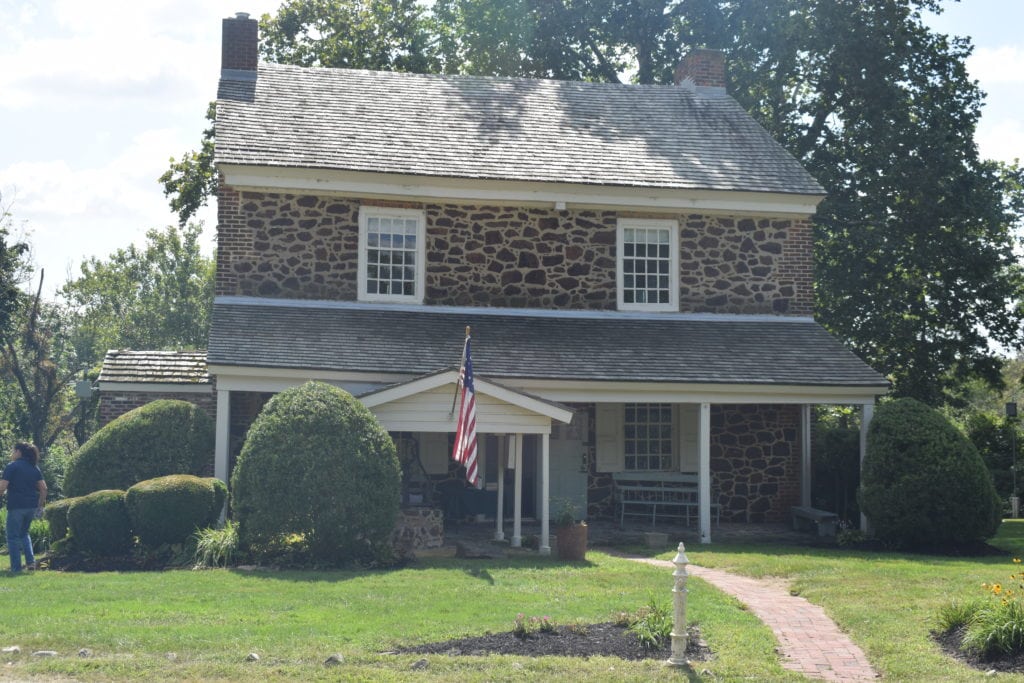

The historic Gabreil Daveis Tavern in Gloucester Township, Camden County, welcomed 700 guests Nov. 28 at a holiday open house. Santa Claus took photos with youngsters as he stood by his historic red sleigh while holiday music was performed by The Harmony Show Choir.
The Tavern’s final public tour for 2021 will be Sunday, Dec. 12 from 1 to 4 p.m. with the Tavern decked out in Holidays finery, said Sharon Mickle, president of the Gloucester Township Historic & Scenic Preservation Committee.
Mickle welcomed visitors, inviting small groups to begin the tour in the tavern’s kitchen. Jeff Lilly, Historic Committee secretary, opened the tour with a short history of the tavern, saying “In 1756, Gabreil Daveis built the two-story, eight-room red brick house. Bricklayers recorded the date on the building’s western gable, a common practice among the English forefathers of New Jersey’s earliest settlers.”
Guests then passed through the dining room with the dining table formally set for the holidays and two violinists filling the tavern with holiday music. Mrs. Claus greeted visitors into the living room and asked the children to write letters to Santa and leave their letters in the Blackwood Post Office Box display.
“Gabreil Daveis used the house as a tavern to provide for his family. In those days,” said Mrs. Claus, ” ‘Tavern’ was the name used for what is now a hotel. It also functioned as a community meeting place as well as a place for area residents to pick up their mail.
“While many frequenting the tavern were boatmen, some arrived on horseback. These guests ate their meal and were taken to a bedroom upstairs where they put down their saddle and blanket for the night. The lucky ones slept closest to the fireplace,” Mrs. Claus said. “There was no such thing as a single room or even a bed in those days for travelers.”
The tour ended in the house’s public room where Stephanie Roberts, Historic Committee vice president, pointed out a large century-old State of New Jersey map on display. Ms. Roberts then showed visitors several objects commonly used in the 1700s.
Holding up a 3-foot-long iron L-shaped object, she asked, “What do you think it is?” After several guesses, one said, “It was used by cobblers to make shoes.
“Yes,” said Ms. Roberts, “cobblers traveled from place to place using this one tool for both feet adjusting the small end for measuring the length of a person’s foot without regard to right or left foot!”
The tavern sits beside the Big Timber Creek, wider and deeper than it is today. The creek empties into the Delaware River and was used to transport goods to Philadelphia. These goods were put on large river ships and included lumber milled nearby used for buildings in the growing city.
After Daveis died in the late 1760s, his wife, Sarah renewed the Tavern’s license for the next two years. Some years later the house passed to two locally important Revolutionary War heroes. The property then passed to the Warwick family who married into the Jaggard family. These two families owned the property for more than 100 years.
In 1929, the last of the Jaggards, Joseph, sold the house to William F. Schuck, an engraver at the Philadelphia Inquirer. Mr. Schuck had tried to buy the house for years but Jaggard would not sell. Finally, he agreed on one condition: Schuck had to let Joseph live in the house for the rest of his life where he lived another 33 years. Schuck and Jaggard had bedrooms upstairs and worked together to meet their daily needs while making many of the needed house repairs.
The house was badly rundown when Schuck purchased it due to Jaggard’s lack of financial means required for the needed repairs. Over the years, Schuck and Jaggard made repairs and restored the tavern house back to its original glory. By restoring the tavern, they preserved “a small but visible part of the region’s unique cultural heritage,” according to a book developed by the Gloucester Township Historic & Scenic Preservation Committee.
William Schuck left the house to Gloucester Township in Camden County for one dollar when he died in 1976. In his will, Schuck stipulated the township create a historic society, keep the house open for public tours, and allow him to be buried on the property. Mr. Schuck’s grave is located on the front lawn, a short distance from the house.
The tavern, free admission to the public, will open for the 2022 season in April with a Colonial Life encampment. Reenactors from the Garden State Black Powder Association have been invited to camp with demonstrations of campfire cooking, wool spinning and weaving, blacksmithing, breadmaking and children’s militia drills reenacted throughout the weekend, according to Mickle.
“There are many activities planned to enlighten and entertain children, parents and grandparents, including how to throw a tomahawk, shoot a primitive bow and arrow, fire a flintlock rifle and children’s games,” Mickle said. “A past special crowd pleaser is the cannon firing demonstration.”
The tavern is open for visitors free of no charge on the second and fourth Sunday of the month from April through November and the first two Sundays in December from 1 to 4 p.m. Visitors learn about this important, well-preserved piece of history, a few miles from Philadelphia in Camden County, New Jersey.
Members of the Gloucester Township Historic & Scenic Preservation Committee give small group tours with stories and history of the Tavern and life in the 1700s. The Gabreil Daveis Tavern located at 500 Third Ave., Glendora, off Black Horse Pike (Rte 168).









